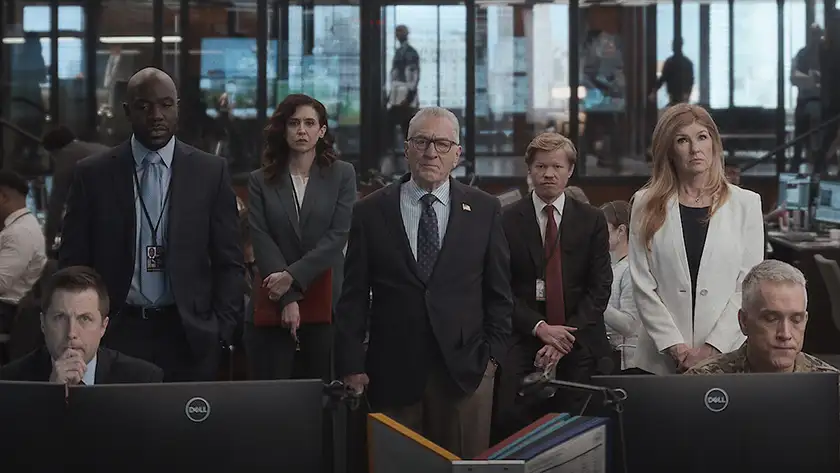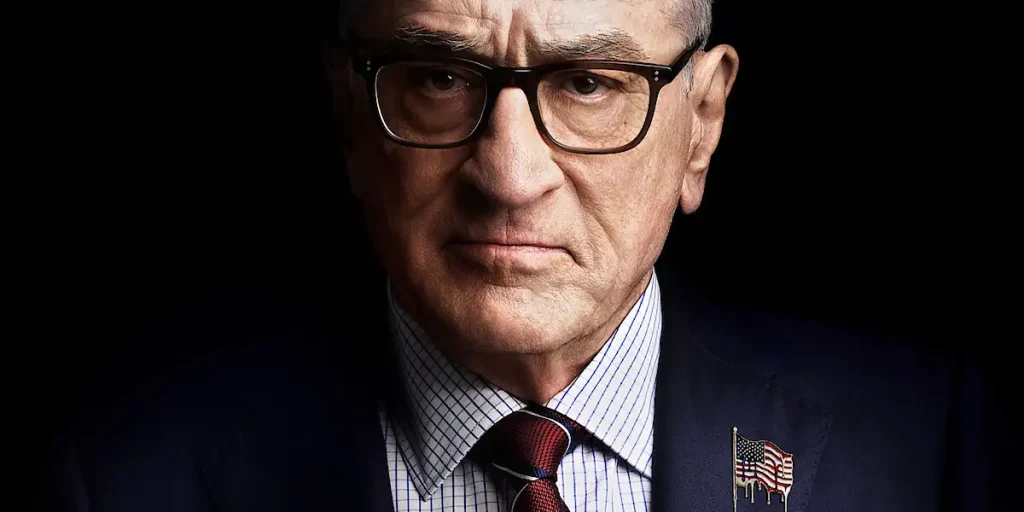Chaos, politics, and cyber attacks: Netflix series Zero Day delivers it all in a political thriller that is more similar to our world than we might want to admit.
Director: Lesli Linka Glatter
Creators: Eric Newman, Noah Oppenheim, Michael Schmidt
Genre: Political Thriller; Mini Series
Number of Episodes: 6
Release Date: February 20, 2025
Where to Watch: Stream it on Netflix
Widespread riots across the United States, a terrifying global threat that leads to the suspension of individual liberties, and rampant misinformation across social media channels. This is not a description of modern politics, but the beginning of Zero Day, Netflix’s newest television series that sees Robert De Niro in the main role. With its poignant representation of issues the audience is more than familiar with, the show does not necessarily give us all the answers but it does raise some necessary questions that may help us navigate our current political climate.
When a cyber-attack derails virtually any system using modern technologies in the United States, causing thousands of deaths and widespread chaos and fear across the country, President Evelyn Mitchell (Angela Bassett, of Black Panther: Wakanda Forever) must act quickly to protect her people and find the perpetrators of this unclaimed attack. In order to do so, she recruits George Mullen (Robert De Niro, of Taxi Driver), a beloved former President with a troubled personal history, to head the newly founded Zero Day Commission, which is aimed at discovering the truth about such a devastating cyber attack. But will George be able to uncover the web of secrets that seem to surround these events when his own memory starts to falter?
From the opening scene of Zero Day, the Netflix series delivers its stakes incredibly well: as George frantically looks for his precious notebook that seems to have disappeared, the other characters are insisting that he come out immediately. We might not yet know what exactly is happening, but the viewers immediately understand the main conflict at the core of the show between the protagonist and United States politics.
While it may be slightly expositionary at times, the writing is impressive in the way it delivers on such an interesting premise and touches on important topics without falling into the trap of preaching to the audience in a moralistic manner. While a lot of the themes are relatively complex – the focus of the plot is very much on political theory and the technical details of the cyber attack – the show succeeds in explaining these easily to viewers who might not necessarily be familiar with them beforehand.

As I kept watching the episodes of Zero Day, I found myself unable to look away and not press the continue watching button. This only speaks to the way the show is able to keep its audience on the edge of their seats until the very last scene, and until every plotline is resolved and addressed. The 6-episode Netflix series is highly binge-worthy: you could easily watch it in just one day. The tension keeps building in each episode as the conflict soon becomes both personal to the characters involved and universal to the stakes of the whole country. As the two elements often intertwine, they also sometimes oppose one another when what seems best for George’s own future and family might not be right for the fate of the country he has promised to serve.
As Zero Day begins, it is immediately clear that the main question that moves George to action is the search for truth on multiple levels. On one hand, he has to uncover who is behind these cyber attacks and find an answer for his country as the latter is slowly descending into violence and chaos. But on the other hand, George is also looking for the truth within himself as his own memory and recollection of events becomes confused, disorganised and, ultimately, perhaps unreliable. The audience experiences the latter first-hand too, as we mostly see the events unfold from George’s perspective, but can we trust his point of view?
The series also offers a powerful commentary on today’s political climate, especially in the United States. The world that Zero Day depicts is not too far from our own – except for having a black woman as the president of the United States – which makes the possibility of a cyber attack like the one in the show more believable. While the audience has not experienced this scenario yet, we witnessed a similar level of chaos and fear in recent years, with the COVID-19 pandemic in 2020 and the Capitol Hill attack in 2021 – the scenes of riots in the show reminded of the latter in more than one occasion – just to name two examples.
In the midst of chaos, Zero Day is not afraid to ask us some very urgent questions: how do you find the truth in a world where misinformation constantly goes unchecked? How can you oppose widespread fear and turmoil while remaining lawful and morally correct? These are some very serious concerns in the show, but they are also some of the key issues of our current politics. Its setting is virtually modern-day United States, suggesting that this is not just fiction and the viewers might eventually find themselves living through the circumstances that are depicted in the Netflix series. Despite some very clear – and sometimes too on the nose – references to real-life politicians the audience will be familiar with in some of the main characters, the show also does a good job at distancing itself from our current politics enough to remain a work of fiction, even if it is one that bears a warning for the country’s present and future.
I also really liked how Zero Day does not necessarily go for the overused and easy answer to solve its conflict but, instead, chooses a bold and original option that feels a lot more authentic to the world we live in, while also avoiding the narrative American cliché of always blaming a foreign country as their enemy. At the same time, the Netflix series does feature a black-and-white separation of heroes and villains. Instead, they all have some positive and negative traits: even the antagonist characters exhibit reason and the apparent good guys also have their faults, making everyone in the show more three-dimensional and well-rounded.
Overall, Zero Day is an incredibly well-written political thriller. Not only will you easily binge-watch it in a day, but it also raises some very necessary concerns and questions about today’s politics. When the world seems to be taken over by the far-right and misinformation runs rampant on most of our communication channels, how do you find the truth? And is it even worth searching for?
Zero Day: Series Plot & Recap
Synopsis:
When the country is taken over by a powerful cyber attack from an unknown enemy, former president George Mullen is asked to lead the investigation on the attack and find out who is responsible in a political climate made up of conspiracy theories, fear, and misinformation.
Pros:
- The tension and stakes are built really well from the very first scene.
- It invites a necessary reflection on today’s political scenario, especially in the United States.
- The resolution of the conflict doesn’t necessarily go in the expected and overused cliche that we might anticipate.
Cons:
- Sometimes the references to current politics in the main characters are too on the nose.
Zero Day is now available to watch globally on Netflix.

